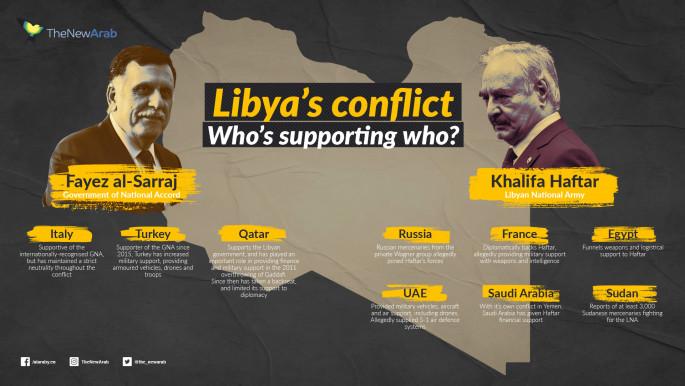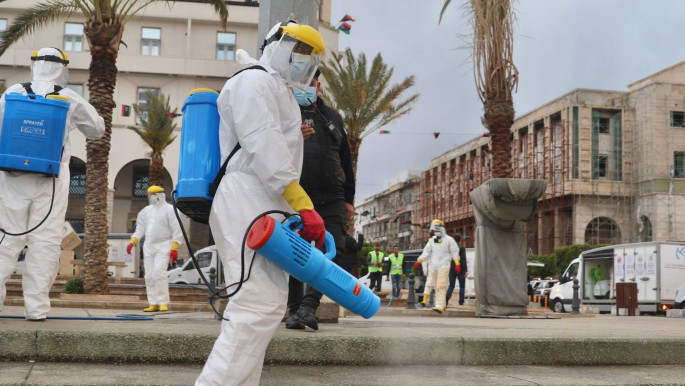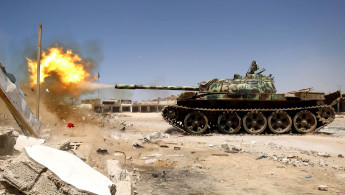Foreign mercenaries and fractured healthcare heighten Libya's coronavirus risks
Already suffering a deteriorating humanitarian situation from its raging conflict, the very nature of Libya's internationalised war means the coronavirus pandemic could hit the country harder as violence drags on.
Civilians in Tripoli are rushing to supermarkets, desperately seeking to grab limited commodities which they fear may sell out. Yet prices are soaring, as the Libyan dinar plummets.
Meanwhile vulnerable people like migrants and asylum seekers are helpless to avoid the Covid-19 spread whilst trapped in poor conditions, and facing being cut off from aid.
Though other countries can go into lockdown, Libya's capabilities to do so are limited given its division between two rival governments, while it is vulnerable to ongoing foreign intervention which could further enhance Covid-19's spread.
On 24 March, the Tripoli-based Government of National Accord (GNA) declared its first case of Covid-19, after a man travelled back from Saudi Arabia, and has reached 26 recorded cases as of 14 April.
Libya's rival governments announced the closure of schools on 13 March, and have both delivered aid money to local health services, taking pre-emptive steps to contain the spread.
UN Secretary General Antonio Guterres called on 25 March for a regionwide ceasefire, to allow for preparation to contain the virus. Meanwhile Donald Trump and Turkish President Recep Tayyip Erdogan held a phone call on 24 March and discussed the need for a ceasefire amid the coronavirus pandemic.
 |
Libya's capabilities to put the country under lockdown are limited given its division between two rival governments |  |
However, such initiatives have not been heeded. GNA Prime Minister Fayyez al-Sarraj on 27 March slammed warlord Khalifa Haftar's forces, accusing them of undermining efforts to defeat the virus.
One year ago, Haftar's self-proclaimed Libyan National Army (LNA) launched its war on Libya's capital Tripoli, seeking to capture the entire country and disrupt Libya's peaceful democratic transition.
As the current war has since intensified, Libya has faced considerable destabilisation. Even in recent weeks, Haftar's forces have carried out several mortar attacks on the capital Tripoli. Meanwhile Turkish warships have reportedly fired on Haftar's forces which are advancing on the capital.
Libya is locked into a regional geopolitical war. While Turkey and Italy support the GNA, Haftar receives backing from the United Arab Emirates (UAE), Russia, France, Egypt and Saudi Arabia. The Berlin Conference in January, designed to forge a ceasefire and enforce the UN arms embargo, failed to make a breakthrough, as external actors have continued to drive Libya's war.
 |
|
| Click to enlarge |
Meanwhile the US, UK and general European indifference towards the conflict have left peace efforts fruitless, allowing Haftar's assaults to continue unanswered.
As Haftar is determined to capture Tripoli, the coronavirus crisis gives him more of a smokescreen to push forward in his campaign.
Yet, being awash with foreign forces and interventions, the flow of mercenary fighters and military equipment into Libya could lead to spreading the virus within the country.
Read more: 'Our fear is doubled': Exhausted by war, Syrians struggle to cope with coronavirus pandemic
"On the one hand, commercial flights are blocked, some of the busiest border crossings are closed, there is a curfew, but at the same time military flights continue coming in from both Turkey and the United Arab Emirates," Jalel Harchaoui, Libya expert and research fellow at the Clingendael Institute, told The New Arab.
The GNA's Interior Ministry warned in late March that an influx of Russian sponsored Syrian mercenaries would lead to a greater spread of coronavirus, given their activities elsewhere in the Middle East, such as Iran, where coronavirus infections are widespread.
 |
Awash with foreign forces, the flow of mercenary fighters and military equipment into Libya could further spread the virus |  |
Meanwhile, GNA forces claimed the downing of a UAE drone – showing its continued substantial backing through military equipment and mercenaries to Haftar's forces - poses a major risk of spreading the virus.
"These injections of foreign individuals, whether they are mercenaries, arms experts or other types of advisers, prove that the coronavirus scares only the civilians not those that wage the actual war, unfortunately," Harchaoui added.
As militias travel from the eastern side of the country towards the West, this also risks transporting the virus.
Since the NATO-backed revolution against former leader Muammar Gaddafi in 2011, rival factions have fought to control Tripoli, which became Libya's power centre under Gaddafi's rule. Now the country has largely become decentralised and is effectively split between two rival governments.
As a result, Libya is limited in its capabilities to combat coronavirus in a unified manner, given the country's divisions and its devastated healthcare system – which the fighting has already worsened.
 |
|
| Read more: Libya is catastrophically ill-equipped to battle a coronavirus outbreak. Here's why |
"This is a health system that was close to collapse before you get the coronavirus," Elizabeth Hoff, head of mission for the World Health Organization in Libya, told Reuters on 24 March.
Last November, WHO reported that many Libyans and non-Libyans in the country already lack access to basic healthcare treatment. Furthermore, over 60 attacks on healthcare facilities occurred in 2019, soaring throughout Haftar's campaign on Tripoli.
Due to electricity cuts, especially in bigger cities like Tripoli, healthcare facilities are limited in their abilities to treat people as their equipment is often not fully functioning.
Any spread of Covid-19 would effectively overwhelm Libya's already fractured healthcare system, making it difficult to contain the spread and alleviate Libya's wider humanitarian situation from the war.
To add to Libya's economic woes, the resource-rich country has already lost around $4 billion since January after a continued production stoppage. The current oil price war between Saudi Arabia and Russia, partly triggered by the coronavirus' evaluation of the resource, could further harm Libya's economy.
However, despite increasing awareness within Libyan society over the risks that coronavirus poses, not everyone can follow recommended precaution measures.
 |
Libya is still at the beginning of the cycle, there isn't yet a real awareness that there is now an enemy that is more ferocious than the calamity of war |  |
"Social distancing measures means nothing for the 160,000 people displaced by the war, or the several thousands of irregular migrants crammed up in detention centres. Because of a lack of protective equipment, health care personnel feel scared and demobilised. Some even refuse to go to work, whether in Cyrenaica or in Tripoli," said Harchaoui.
On 29 March, Human Rights Watch also called for Libya to release prisoners in places where the virus' spread is heightened, among these include Misrata's Al-Jawiyya prison and Tripoli's Migata prison, where wives and children of Islamic State (IS) suspects are held without charge.
Read more: Middle East regimes are freeing inmates as coronavirus spreads. But political prisoners remain behind bars
The following day, the GNA's justice ministry announced its freeing of 466 detainees from "correctional facilities" in Tripoli.
"Libya is still at the beginning of the cycle, there isn't yet a real awareness that there is now an enemy that is more ferocious than the calamity of war. In all cases, the health system is extremely frail," added Harchaoui.
As peace initiatives have previously failed for Libya, the global focus on combatting coronavirus could further weaken the already-low impetus to bring an end to its conflict, leaving Libya helpless to deal with its own outbreak.
Jonathan Fenton-Harvey is a freelance journalist.
Follow him on Twitter: @jfentonharvey



